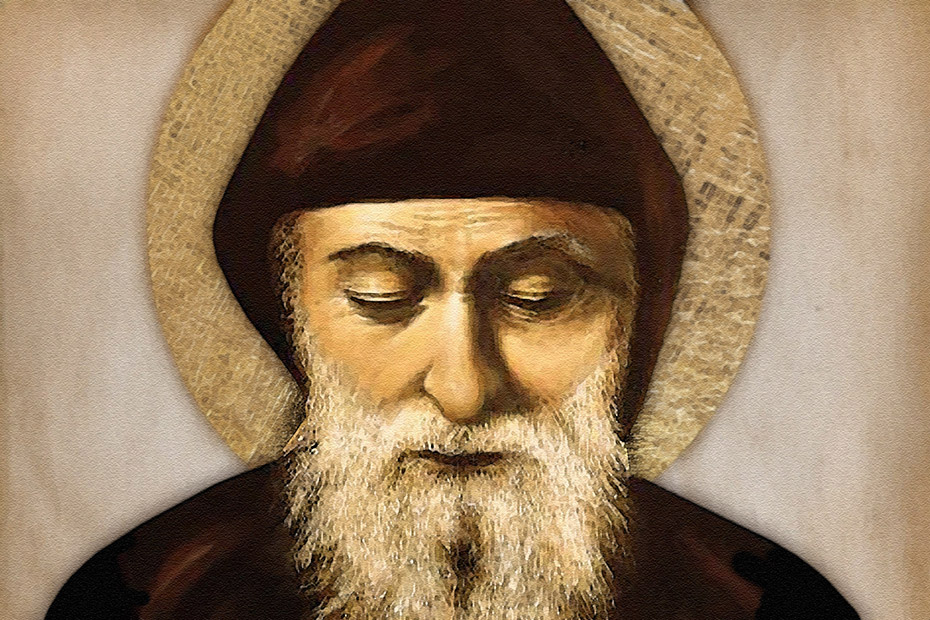By Susan Ciancio
On July 24, we celebrate the Feast of St. Charbel Makhlouf, a Lebanese monk and priest of the Maronite order who was born Youssef Zaroun Maklouf on May 8, 1828.
When Youssef was just three years old, his father died, so he was raised by his mother and his paternal uncle. Both were devout and raised him and his siblings in the faith. From the time Youssef was young, he was drawn to God. When he tended sheep near his home, he found a grotto where he placed an icon of the Virgin Mary and would frequently pray to her. Townspeople saw his piety and began calling him a little saint.
Youssef joined a monastery at the age of 23 and took the name Charbel. After studying for six years, he was ordained a priest. He lived and worked at the monastery for 16 years.
During that time, he spoke of becoming a hermit so he could separate himself from this world and attach himself in a deeper way to Christ. But his superiors would not allow him to do so. Charbel faithfully obeyed them. He spent his days praying, fasting, and helping those in need. He would often go into the local town and heal the sick, even casting out demons. He soon earned a reputation for these miracles and people began to call him the “wonder worker.”
In 1875, as a prank, someone at the monastery put water instead of oil in his lamp so he could not turn it on. Not knowing this, Charbel turned it on as usual one night, and it lit. When his superiors learned of this, they were astounded, and they believed it was a sign from God, so they allowed him to move to the nearby Hermitage of Sts. Peter and Paul to live as a hermit.
At the hermitage, Charbel prayed, fasted, did manual labor in the fields, and spent time with Jesus in Adoration. The Eucharist became the center of his life. He lived there until his death in 1898.
Though Charbel was a humble man, who dressed very plainly and rarely spoke, his writings and his sermons show that he was extremely intelligent.
It is fitting that the miracle that led to his superiors permitting him to live as a hermit involved light, as he often talked about people being the light of Christ here on earth and shining that light to others.
Miraculously, after his death, a bright light emanated from Charbel’s tomb. Villagers saw it from a great distance away and alerted the monks. When they went to investigate, they found that Charbel’s body was incorrupt. They moved him to a different tomb, and for several decades his body would lie in that state, even emitting water, as if he were sweating.
People began visiting his tomb, and thousands have spoken of healings—both physical and spiritual. Today, millions of people visit each year.
Because Charbel’s sermons teach us so much about how to treat others and about how to live our lives for Christ, we want to share six of our favorite quotes from them. As you celebrate his feast day, read his words, sit in quiet contemplation, and allow God to transform your heart:
1. “Every human being is a flame created by our Lord to enlighten the world. Every human being is a lamp made by him to shine and to give light.”
2. “Allow some time for each of your brethren. Show him the way, direct him toward the light; if he wants to walk alongside you, ask him to go ahead of you; if he wants you to hold his hand, hold both of them.”
3. “Stand firm on board the boat of the Lord, and strengthen your brethren at each port where you land. Invite people to take part in your voyage so as to share with them your arrival at the destination. Speak to them about your pilot and about the shore of light. But be sure that your words are not the thing that convinces people to come on board the Lord’s boat, but rather your confidence, your faith in him, and the joy that is visible on your faces.”
4. “Become totally involved in the Church and adhere to her teaching. Persevere in prayer without ceasing. Venerate your Mother, the Virgin Mary. Arm yourself with the rosary, for the name of the Virgin Mary dispels the darkness and crushes evil.”
5. “Salt that does not dissolve is useless as a seasoning. Spoiled salt troubles the water and spoils the food; good salt dissolves and disappears in water. It gives neither form nor color to the food, but heightens its flavor. You are the salt of the earth: if you make your life a private property, it will be in vain; whereas if you give it away, its value increases. It will reach its fullness when it is the property of all.”
6. “He who appears before the Lord, empty of love, will die of shame. That is his true death and not the moment when he gives up his soul.”
When we reflect on the words of this wise and holy saint, we get to know his heart a little better. And as we get to know his heart, we grow in understanding of the heart of Jesus.
That is the beauty of learning about the lives of saints. Their examples and their teachings help us to grow closer to the Lord, to see others through His eyes, and to love even deeper.
